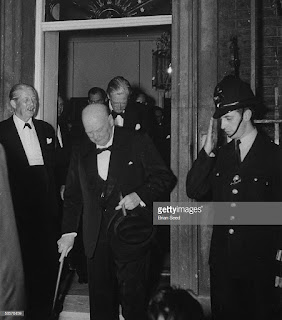Eighty years ago, the Munich debate writes the future of British politics, Mussolini smudges the ledger of appeasement and bloodshed in Palestine is dripped over the Nazi score sheet
Over three days Parliament debated Neville
Chamberlain’s diplomacy that led to the Munch agreement. The
first was only noticeable for the restrained resignation speech of Duff Cooper,
the only member of Cabinet to give up his position in protest. There was some
concern in the government that there might be a significant rebellion in its
ranks but in the end only a handful of MPs abstained and Chamberlain secured an
overwhelming victory. The abstainers, though, were writing the future of Tory
government for the next quarter century. They included the next three
Conservative prime ministers, Churchill, Eden and Macmillan. It marked the moment
that the first two, each heavyweights in their different ways, moved into
internal opposition to the prime minister. Chamberlain had enjoyed a huge
triumph at Munich but, invisible for nearly another two years, the tide of
history had turned against him.
With perfunctory explanation the
withdrawal of 10,000 Italian “volunteers” (in reality regular army units) was
announced from Spain, perhaps a sixth of those engaged. A blizzard of
obfuscating commentary from Rome attempted to distract observers from the
suspicion that this wasa precondition for the still-awaited ratification of the
Anglo-Italian Easter agreements. These anticipated the de jure recognition of the conquest of Ethiopia (“the Italian
Empire” in Mussolini’s phraseology) but this had yet to be granted. Rome was
keen to avoid the suggestion that the size of the withdrawal was calibrated to
count somehow as meaningful progress towards disengagement in some diplomatic
formula that would have to be resolved for Mussolini to receive the prize of
recognition. Pride argued against admitting to being obliged to meet the
Italian part of the bargain before the British met theirs. This was the end run
to the process of negotiation that Chamberlain had forced Eden’s resignation to
set in motion the previous February. The withdrawal was a pitiful reward for
British appeasement, however reluctant Italy might be to acknowledge it.
The curve of violence moved
upwards in Palestine. 19 unarmed Jews including women and children were
slaughtered at Tiberias. There were also attacks on British forces. This all
came at a convenient moment for Hitler who was always happy to pepper his
speeches with references to British embarrassments in Palestine if London
showed the least inclination to take a moral high ground as the German occupation of their spoils from Munich might have encouraged them to do..



Comments
Post a Comment